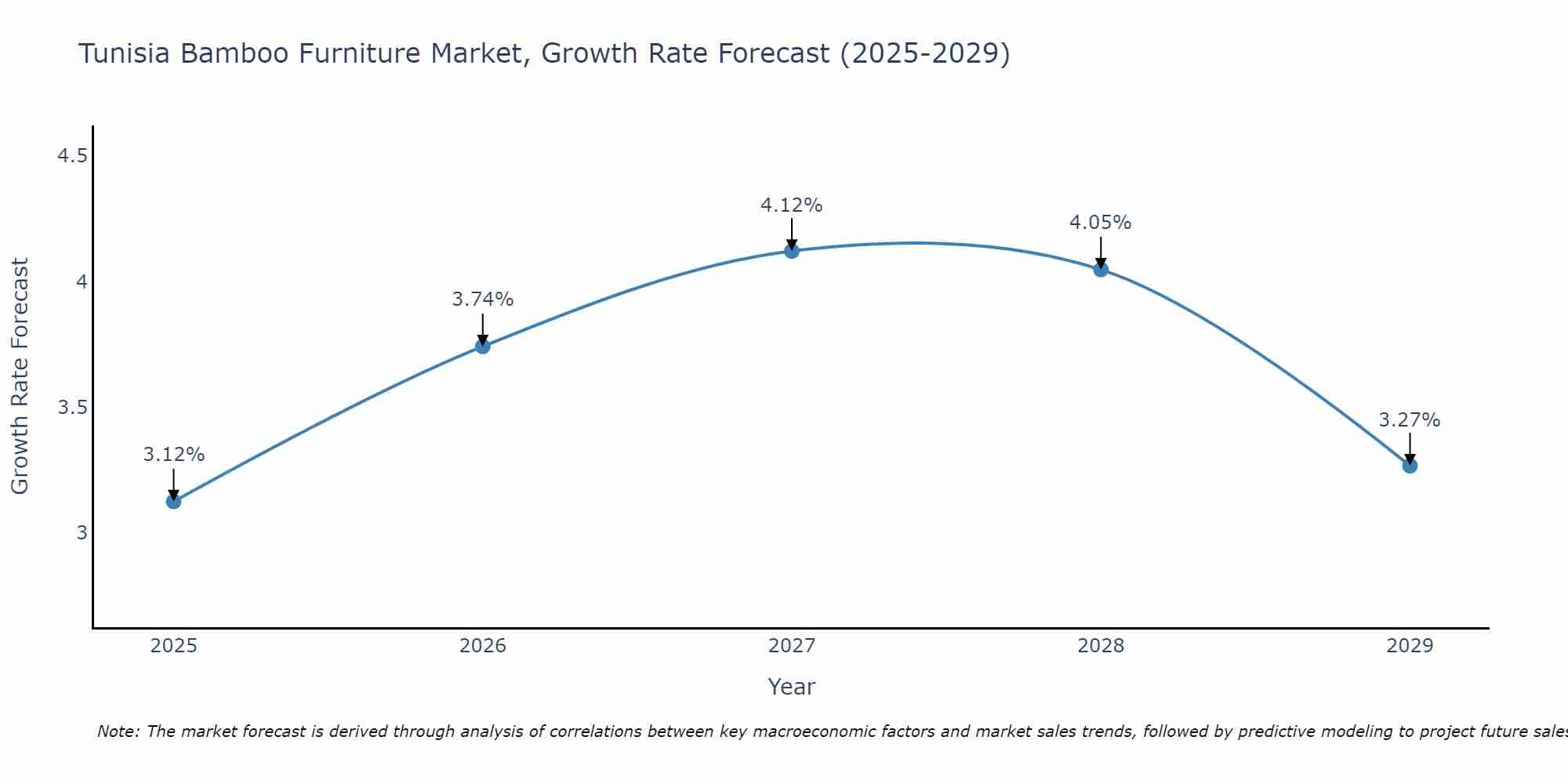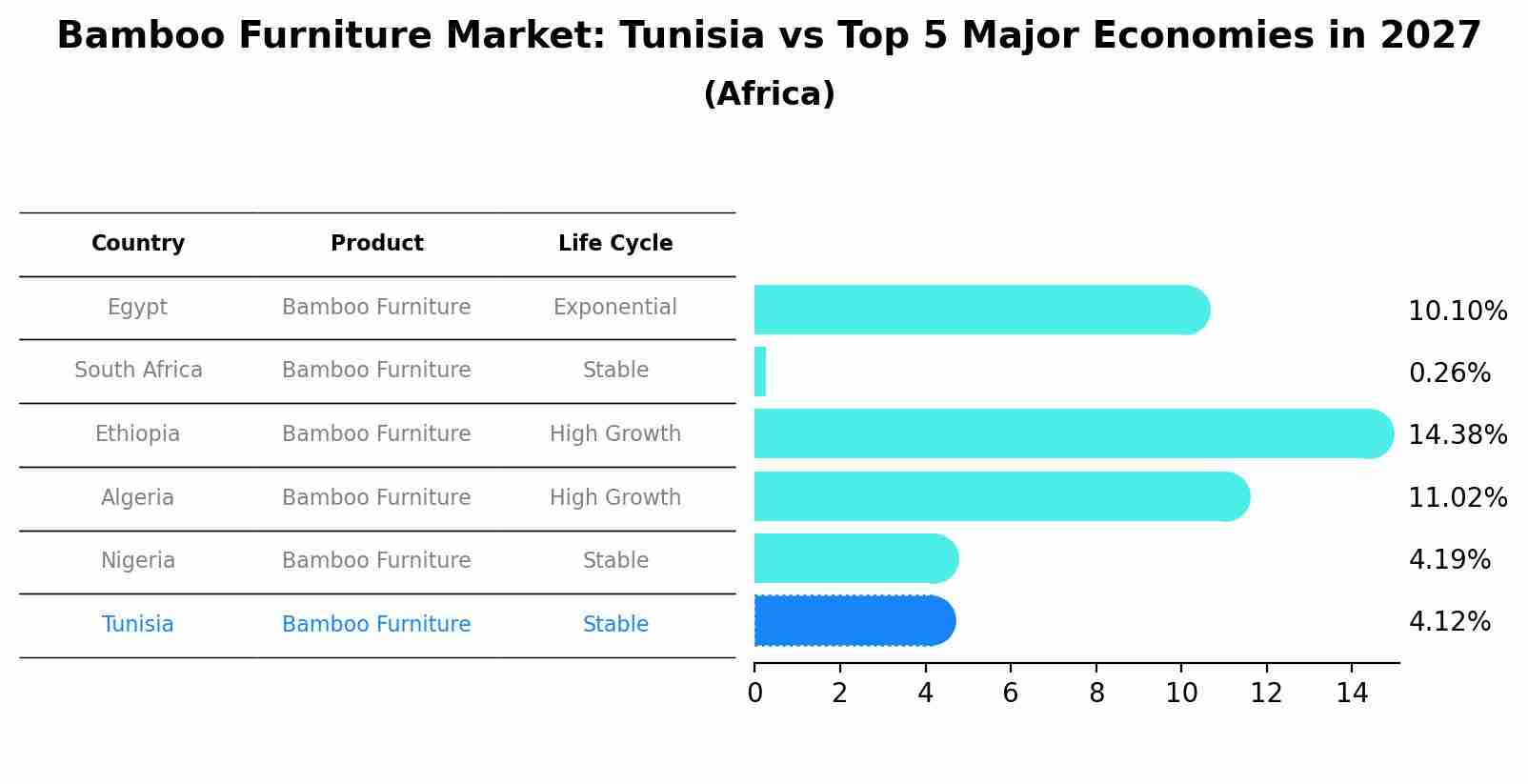Tunisia Bamboo Furniture Market (2025-2031) Outlook | Growth, Analysis, Revenue, Value, Size, Forecast, Trends, Companies, Share & Industry
| Product Code: ETC370914 | Publication Date: Aug 2022 | Updated Date: Jul 2025 | Product Type: Market Research Report | |
| Publisher: 6Wresearch | Author: Ravi Bhandari | No. of Pages: 75 | No. of Figures: 35 | No. of Tables: 20 |
Tunisia Bamboo Furniture Market Size Growth Rate
The Tunisia Bamboo Furniture Market is projected to witness mixed growth rate patterns during 2025 to 2029. Starting at 3.12% in 2025, the market peaks at 4.12% in 2027, and settles at 3.27% by 2029.

Bamboo Furniture Market: Tunisia vs Top 5 Major Economies in 2027 (Africa)
By 2027, Tunisia's Bamboo Furniture market is forecasted to achieve a stable growth rate of 4.12%, with Egypt leading the Africa region, followed by South Africa, Ethiopia, Algeria and Nigeria.

Tunisia Bamboo Furniture Market Synopsis
The Tunisia Bamboo Furniture Market is experiencing steady growth due to increasing consumer demand for sustainable and eco-friendly furniture options. Bamboo furniture is known for its durability, versatility, and natural aesthetic appeal, making it a popular choice among environmentally conscious consumers. The market is driven by factors such as rising awareness of sustainability, growing disposable income, and a shift towards eco-friendly products. Key players in the market are focusing on innovative designs and product development to cater to evolving consumer preferences. With the government also promoting sustainable practices, the Tunisia Bamboo Furniture Market is expected to continue its growth trajectory in the coming years, offering opportunities for both local manufacturers and international exporters.
Tunisia Bamboo Furniture Market Trends
In Tunisia, the bamboo furniture market is experiencing a growing demand for eco-friendly and sustainable furniture options. Consumers are increasingly seeking products that are not only stylish and functional but also environmentally friendly. Bamboo furniture is gaining popularity due to its renewable nature, durability, and versatility in design. Additionally, there is a rising trend towards natural and organic materials in home decor, making bamboo furniture a preferred choice for many customers. The market is seeing a shift towards modern and minimalist designs that showcase the beauty of bamboo while incorporating it into contemporary interiors. With a focus on sustainability and aesthetics, the Tunisia bamboo furniture market is expected to continue its growth trajectory in the coming years.
Tunisia Bamboo Furniture Market Challenges
In the Tunisia Bamboo Furniture Market, challenges include limited consumer awareness and acceptance of bamboo furniture as a sustainable and eco-friendly alternative to traditional furniture materials. The lack of widespread knowledge about the benefits of bamboo furniture hinders market growth and adoption. Furthermore, the availability of high-quality bamboo materials and skilled artisans for furniture production can be limited, affecting the overall supply chain and resulting in higher production costs. Additionally, competition from other types of furniture materials and established brands poses a challenge for bamboo furniture manufacturers in gaining market share and establishing a strong foothold in the industry. Overcoming these challenges will require targeted marketing efforts, investments in quality control and production processes, as well as education initiatives to increase consumer understanding and appreciation of bamboo furniture.
Tunisia Bamboo Furniture Market Investment Opportunities
The Tunisia Bamboo Furniture Market presents promising investment opportunities due to the increasing global demand for sustainable and eco-friendly products. Bamboo furniture is known for its durability, light weight, and environmental benefits, making it an attractive choice for both residential and commercial settings. Investors can capitalize on this trend by manufacturing or importing bamboo furniture to meet the growing demand in Tunisia and potentially export to other markets. With the government`s focus on promoting green initiatives and sustainable development, bamboo furniture aligns well with the country`s environmental goals. Additionally, investing in innovative designs, marketing strategies, and partnerships with local artisans can further enhance the market presence and profitability of bamboo furniture in Tunisia.
Jordan Agar Market Government Policies
The government of Tunisia has implemented various policies to support the growth of the bamboo furniture market. These include promoting sustainable forest management practices to ensure a consistent supply of bamboo, providing financial incentives and subsidies to encourage bamboo cultivation and furniture production, and creating awareness campaigns to educate consumers on the benefits of bamboo furniture in terms of sustainability and environmental impact. Additionally, the government has collaborated with industry stakeholders to develop quality standards and certifications for bamboo furniture to enhance market competitiveness and ensure consumer confidence. Overall, these policies aim to boost the local bamboo furniture industry, create employment opportunities, and contribute to the country`s sustainable development goals.
Tunisia Bamboo Furniture Market Future Outlook
The Tunisia Bamboo Furniture Market is expected to witness steady growth in the coming years due to increasing consumer awareness of sustainable and eco-friendly furniture options. Bamboo furniture is gaining popularity for its durability, versatility, and aesthetic appeal, making it a preferred choice for environmentally-conscious consumers. With the government`s focus on promoting sustainable practices and the growing trend towards eco-friendly living, the demand for bamboo furniture is projected to rise. Additionally, the rising disposable income among the Tunisian population is also expected to drive market growth as consumers seek high-quality and stylish furniture options. Overall, the future outlook for the Tunisia Bamboo Furniture Market appears promising, with opportunities for market players to capitalize on the growing demand for sustainable furniture solutions.
Key Highlights of the Report:
- Tunisia Bamboo Furniture Market Outlook
- Market Size of Tunisia Bamboo Furniture Market, 2024
- Forecast of Tunisia Bamboo Furniture Market, 2031
- Historical Data and Forecast of Tunisia Bamboo Furniture Revenues & Volume for the Period 2021 - 2031
- Tunisia Bamboo Furniture Market Trend Evolution
- Tunisia Bamboo Furniture Market Drivers and Challenges
- Tunisia Bamboo Furniture Price Trends
- Tunisia Bamboo Furniture Porter's Five Forces
- Tunisia Bamboo Furniture Industry Life Cycle
- Historical Data and Forecast of Tunisia Bamboo Furniture Market Revenues & Volume By Type for the Period 2021 - 2031
- Historical Data and Forecast of Tunisia Bamboo Furniture Market Revenues & Volume By Chairs & Tables for the Period 2021 - 2031
- Historical Data and Forecast of Tunisia Bamboo Furniture Market Revenues & Volume By Stools for the Period 2021 - 2031
- Historical Data and Forecast of Tunisia Bamboo Furniture Market Revenues & Volume By Beds for the Period 2021 - 2031
- Historical Data and Forecast of Tunisia Bamboo Furniture Market Revenues & Volume By Others for the Period 2021 - 2031
- Historical Data and Forecast of Tunisia Bamboo Furniture Market Revenues & Volume By End User for the Period 2021 - 2031
- Historical Data and Forecast of Tunisia Bamboo Furniture Market Revenues & Volume By Residential for the Period 2021 - 2031
- Historical Data and Forecast of Tunisia Bamboo Furniture Market Revenues & Volume By Commercial for the Period 2021 - 2031
- Tunisia Bamboo Furniture Import Export Trade Statistics
- Market Opportunity Assessment By Type
- Market Opportunity Assessment By End User
- Tunisia Bamboo Furniture Top Companies Market Share
- Tunisia Bamboo Furniture Competitive Benchmarking By Technical and Operational Parameters
- Tunisia Bamboo Furniture Company Profiles
- Tunisia Bamboo Furniture Key Strategic Recommendations
Frequently Asked Questions About the Market Study (FAQs):
- Single User License$ 1,995
- Department License$ 2,400
- Site License$ 3,120
- Global License$ 3,795
Search
Related Reports
- ASEAN Bearings Market (2025-2031) | Strategy, Consumer Insights, Analysis, Investment Trends, Opportunities, Growth, Size, Share, Industry, Revenue, Segments, Value, Segmentation, Supply, Forecast, Restraints, Outlook, Competition, Drivers, Trends, Demand, Pricing Analysis, Competitive, Strategic Insights, Companies, Challenges
- Europe Flooring Market (2025-2031) | Outlook, Share, Industry, Trends, Forecast, Companies, Revenue, Size, Analysis, Growth & Value
- Saudi Arabia Manlift Market (2025-2031) | Outlook, Size, Growth, Trends, Companies, Industry, Revenue, Value, Share, Forecast & Analysis
- Uganda Excavator, Crane, and Wheel Loaders Market (2025-2031) | Strategy, Consumer Insights, Analysis, Investment Trends, Opportunities, Growth, Size, Share, Industry, Revenue, Segments, Value, Segmentation, Supply, Forecast, Restraints, Outlook, Competition, Drivers, Trends, Demand, Pricing Analysis, Competitive, Strategic Insights, Companies, Challenges
- Rwanda Excavator, Crane, and Wheel Loaders Market (2025-2031) | Strategy, Consumer Insights, Analysis, Investment Trends, Opportunities, Growth, Size, Share, Industry, Revenue, Segments, Value, Segmentation, Supply, Forecast, Restraints, Outlook, Competition, Drivers, Trends, Demand, Pricing Analysis, Competitive, Strategic Insights, Companies, Challenges
- Kenya Excavator, Crane, and Wheel Loaders Market (2025-2031) | Strategy, Consumer Insights, Analysis, Investment Trends, Opportunities, Growth, Size, Share, Industry, Revenue, Segments, Value, Segmentation, Supply, Forecast, Restraints, Outlook, Competition, Drivers, Trends, Demand, Pricing Analysis, Competitive, Strategic Insights, Companies, Challenges
- Angola Excavator, Crane, and Wheel Loaders Market (2025-2031) | Strategy, Consumer Insights, Analysis, Investment Trends, Opportunities, Growth, Size, Share, Industry, Revenue, Segments, Value, Segmentation, Supply, Forecast, Restraints, Outlook, Competition, Drivers, Trends, Demand, Pricing Analysis, Competitive, Strategic Insights, Companies, Challenges
- Israel Intelligent Transport System Market (2025-2031) | Strategy, Consumer Insights, Analysis, Investment Trends, Opportunities, Growth, Size, Share, Industry, Revenue, Segments, Value, Segmentation, Supply, Forecast, Restraints, Outlook, Competition, Drivers, Trends, Demand, Pricing Analysis, Competitive, Strategic Insights, Companies, Challenges
- Uganda Precast and Aggregate Market (2025-2031) | Strategy, Consumer Insights, Analysis, Investment Trends, Opportunities, Growth, Size, Share, Industry, Revenue, Segments, Value, Segmentation, Supply, Forecast, Restraints, Outlook, Competition, Drivers, Trends, Demand, Pricing Analysis, Competitive, Strategic Insights, Companies, Challenges
- Australia IT Asset Disposal Market (2025-2031) | Strategy, Consumer Insights, Analysis, Investment Trends, Opportunities, Growth, Size, Share, Industry, Revenue, Segments, Value, Segmentation, Supply, Forecast, Restraints, Outlook, Competition, Drivers, Trends, Demand, Pricing Analysis, Competitive, Strategic Insights, Companies, Challenges
Industry Events and Analyst Meet
Our Clients
Whitepaper
- Middle East & Africa Commercial Security Market Click here to view more.
- Middle East & Africa Fire Safety Systems & Equipment Market Click here to view more.
- GCC Drone Market Click here to view more.
- Middle East Lighting Fixture Market Click here to view more.
- GCC Physical & Perimeter Security Market Click here to view more.
6WResearch In News
- Doha a strategic location for EV manufacturing hub: IPA Qatar
- Demand for luxury TVs surging in the GCC, says Samsung
- Empowering Growth: The Thriving Journey of Bangladesh’s Cable Industry
- Demand for luxury TVs surging in the GCC, says Samsung
- Video call with a traditional healer? Once unthinkable, it’s now common in South Africa
- Intelligent Buildings To Smooth GCC’s Path To Net Zero













